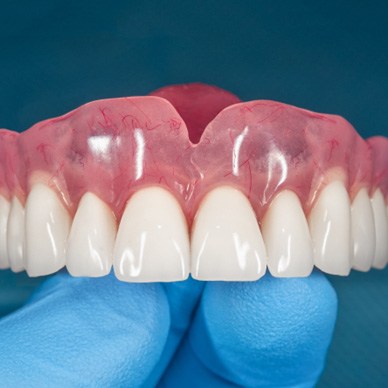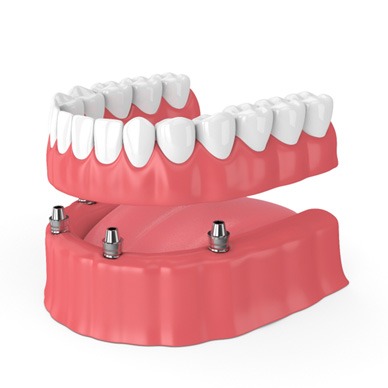
Dentures – Hingham, MA
Bring Back Your Smile with Customized Dentures

Whether you’re missing teeth throughout your mouth or missing all the teeth in your top, bottom, or both arches, it can certainly make your day-to-day more difficult. As you likely know, tooth loss affects far more than simply your ability to smile. Eating becomes a chore, rather than something to look forward to, especially if you previously enjoyed chewy or crunchy foods. For these reasons and more, it’s worth considering a denture not just to take back your smile, but your ability to eat and speak with confidence. Give Dr. Hegazi a call to learn more about dentures in Hingham, MA today!
Why Choose Admired Smiles Dental Center for Dentures?
- Highly Trained Dentist with Decades of Experience
- Materials Personalized for Best Esthetics and Lasting Durability
- Implant Dentures Available for Better Stability
Who is a Good Candidate for Dentures?

It doesn’t matter how severe your tooth loss might be; if you are missing teeth on opposite sides of your mouth or you’re missing all the teeth in a given arch (or even both arches), a denture can be customized to fill the gaps in your mouth and give your smile back. With that said, you will need to complete a thorough exam with Dr. Hegazi to confirm there is no preexisting dental disease. For example, if you have gum disease or tooth decay, these issues will be addressed first. He can also confirm if any extractions need to be completed to make room for your future denture.
Types of Dentures

Modern dentures are more lifelike and comfortable than ever before. Depending on your unique dental needs and concerns, you have options available to you when it comes to your tooth replacement. This includes the following:
Partial Dentures
If you choose a partial denture, it’s because you only need to replace some teeth on opposite sides of your mouth. The restoration fits inside of the mouth similar to that of a puzzle piece, filling gaps left behind to prevent teeth from shifting out of place. The gum-colored based equipped with acrylic or ceramic restorations wraps around existing teeth using metal hooks to remain stable.
Full Dentures
If you need a full denture, it’s because you are missing an entire arch of teeth. A full denture could be used to replace a single or both arches (also known as a complete denture). While they are also made from gum-colored acrylic and either ceramic or acrylic teeth, they stay in place through natural suction to the gums. In the early days of use, it’s common to use denture adhesive as well.
Implant Dentures
Just like the name implies, implant dentures are paired with dental implants to hold a dedicated denture. That means you can expect substantially improved stability and security when using your denture day-to-day. However, you’ll need to have enough bone tissue for the implants to integrate properly.
The Benefits of Dentures

Dentures have been a popular option for replacing teeth for a reason, and it’s not just because of their affordability. For example, they are:
- Effective at restoring your bite and expanding your diet
- Highly personalized for the most comfortable fit possible
- Easy to clean and maintain
- Capable of preserving your mouth shape
- Effective at stopping nearby teeth from shifting
- Can last for many years with proper care
Understanding the Cost of Dentures

During your initial consultation, we’ll be sure to take some time to discuss the cost of dentures. We can give you an estimate and explain how we arrived at it. If you’re worried about your ability to fit dentures into your budget, we can help you come up with a strategy for managing the overall cost. Our goal is to make sure that you have a firm idea of what to expect when the time comes to pay for your dentures.
Factors That Affect the Cost of Dentures

Our team will need to answer several questions when figuring out the cost of your dentures:
- Will other treatments be needed before you can receive dentures? Tooth extractions and other procedures come with their own costs.
- How many teeth need to be replaced? The answer to this question can help determine whether you’re paying for a full denture or a partial denture. Additionally, we’ll need to consider whether you’re replacing both arches of teeth or just one.
- What will your dentures be made out of? Bear in mind that cheaper dentures may not always be the best choice since they can be more prone to breaking.
Are Implant Dentures More Expensive?

Getting implant dentures means having implant posts surgically placed in your jaw. As such, implant dentures tend to cost more than traditional ones. That being said, implant dentures offer a number of important benefits, such as preventing your new teeth from shifting out of place. On top of that, implant dentures can last significantly longer than traditional dentures, which means you can save money by virtue of not having to replace them as often.
Does Dental Insurance Cover Dentures?

When it comes to dentures, many dental insurance plans can indeed be used to help pay for them. Coverage is often around 50%, but factors like your deductible or your annual maximum may affect the amount that you need to pay out of your own pocket.
Not all dental insurance plans are the same. Before you commit to any treatments at our office, we recommend that you double-check your plan to confirm what is and isn’t covered. You can always reach out to your insurance company if you have questions; additionally, our team can review your plan with you to make sure that you understand your benefits.
Other Options for Making Dentures Affordable

Cost shouldn’t have to be a barrier between you and a complete, confident smile. As such, our practice is willing to accept CareCredit financing for patients who would otherwise have trouble fully covering the cost of their care. CareCredit lets you choose a monthly payment plan that works for your budget with little to no interest to worry about, thus taking much of the stress out of paying for your care. Reach out to us if you would like more information about CareCredit and how you can apply.
Denture Maintenance & Aftercare

Once you get your denture, you’ll be amazed by how much confidence it brings to your smile. With the proper maintenance and care, you can continue enjoying this self-esteem boost for up to seven years before it needs to be replaced. Below, our team has outlined some of the most helpful maintenance tips for your new prosthetic to ensure you get the most out of it.
Removable Dentures
Remove & Rinse After Eating
Removable full and partial dentures can make eating much easier, but just like your natural teeth, it’s important to keep your restoration clean to prevent oral infections from developing. One of the best ways to do this is to remove your denture after you eat and rinse it under cool water. This will prevent lodged food particles from sitting between your denture and soft tissue throughout the day, attracting bacteria.
Clean Every Day
In addition to rinsing your removable restoration after every meal, you’ll also need to clean it more thoroughly at least once every day. This will remove plaque build-up, prevent it from smelling, and keep your smile healthier overall.
To clean your denture, you’ll want to use a special denture cleaning brush or soft-bristled toothbrush, clear hand soap or denture cleanser, and room temperature water. Gently brush your restoration to remove any lingering debris. Do not use hot water to clean your prosthetic- this could warp their shape. After you’ve finished, transfer it to a clean washcloth placed on the countertop to prevent it from accidentally slipping and falling onto the floor.
Store in a Safe Area
Whenever you aren’t wearing your denture, you’ll need to store it in a safe place so it doesn’t get broken or damaged. If you have pets, young children, or any person you don’t want to get ahold of your prosthetic, be sure to place it in an area where they can’t reach them. This could be in a cabinet or up high, anywhere where it won’t accidentally get knocked over or damaged.
Take Out Before Going to Sleep
Every night before you go to bed, you’ll need to remove your denture. This is important because it gives your gums a chance to relax and recover after supporting your denture all day, as well as restore blood circulation to the area.
If you have a full removable denture, you’ll need to store it in a glass of room temperature water overnight. This will help it maintain its shape and fit. If you have a partial denture, you can store them in the hard protective case that came with it.
Notice Changes in Fit
With time, you’ll notice that your denture feels different in your mouth. This is because your jawbone structure can change, impacting how your prosthetic fits atop your gumline. If you notice that your denture is causing irritation, redness, or discomfort when worn, it may need to be relined. Dr. Hegazi and our team can either do this in-office if it’s a soft reline or send it off to a laboratory for a hard reline.
All-on-4 Dentures
If you have All-on-4 dentures, these are anchored to your mouth via dental implants. Due to their permanent, non-removable nature, you’ll need to take care of them like you would your natural teeth. You can do this by:
- Brushing them twice each day using a soft-bristled toothbrush and non-abrasive toothpaste.
- Use a water flosser to floss between and around your prosthetic once a day.
- Clean any spaces between your gums and restoration using a sulcus brush.
- Rinse your mouth with alcohol-free mouthwash once a day.
- Schedule your bi-annual checkups and cleanings with our team.
Denture FAQs

Missing one or more teeth can take a significant toll on your mental health. Fortunately, you don’t have to live with these gaps in your smile for the rest of your life. Restoring your grin with dentures in Hingham will allow you to enjoy a fully functioning set of teeth once again. Of course, our team at Admired Smiles Dental Center understands that you want to know more about this treatment before committing to it. To help you out, we’ve decided to answer some frequently asked questions below! If you’d like personal assistance, don’t hesitate to contact us for more details.
Will It Hurt to Get Dentures?
Some patients may need to have teeth extracted before getting dentures. If that’s the case for you, you’ll likely experience some discomfort following your oral surgery. The good news is that it’s temporary and should improve within 3 to 5 days after the procedure. You can also manage it by taking prescribed over-the-counter pain medication as directed.
When you first get your dentures, you might experience mild irritation while you adjust to the new appliance. Although it can take months for the discomfort to fade, the exact amount of time will vary from person to person. Should the pain last longer than that, let us know right away. We can address the underlying issue promptly!
Can I Sleep with My Dentures?
At first, you’ll be asked to keep your dentures in your mouth for 24 hours, including sleep. Then, it’s strongly recommended that you take the prosthetics out every night when you go to bed. Wearing dentures restricts the circulation in your gums, leading to soft tissue irritation and potentially speeding up ridge resorption.
By removing your dentures at night, you allow your gums a chance to recover and get the nutrients they need while you sleep. Otherwise, leaving them overnight can lead to a higher risk of pneumonia and increased levels of gum and tongue plaque.
Should I Have All My Teeth Pulled to Get Dentures?
Absolutely not! Tooth extractions are only recommended if deemed necessary, like when teeth are damaged beyond repair. If an entire arch is decayed or infected, replacing the pearly whites with dentures may be more cost-effective than fixing them with crowns. Rest assured – we’ll explore all of your options before recommending extractions. At the end of the day, our goal is to save as much of your natural tooth structure as possible!
Is It Hard to Talk with Dentures?
Initially, you may have difficulty speaking with your dentures because you’re so used to speaking with your natural teeth. Generally speaking, the more you practice talking with the prosthetics, the faster the adjustment process will go. You can speed up this process by reading aloud, repeating difficult-to-pronounce words, and having more conversations with loved ones. If needed, you can use denture adhesive for extra stability while you’re still adjusting.